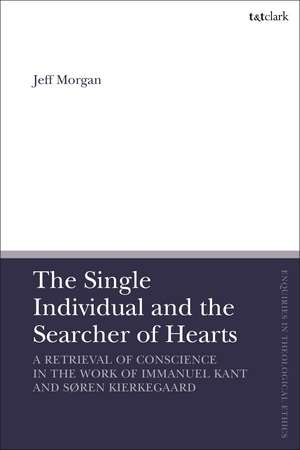The Single Individual and the Searcher of Hearts: A Retrieval of Conscience in the Work of Immanuel Kant and Søren Kierkegaard: T&T Clark Enquiries in Theological Ethics
Autor Jeff Morganen Limba Engleză Paperback – 23 feb 2022
| Toate formatele și edițiile | Preț | Express |
|---|---|---|
| Paperback (1) | 196.54 lei 6-8 săpt. | |
| Bloomsbury Publishing – 23 feb 2022 | 196.54 lei 6-8 săpt. | |
| Hardback (1) | 597.12 lei 6-8 săpt. | |
| Bloomsbury Publishing – 5 aug 2020 | 597.12 lei 6-8 săpt. |
Din seria T&T Clark Enquiries in Theological Ethics
- 23%
 Preț: 192.01 lei
Preț: 192.01 lei - 30%
 Preț: 510.42 lei
Preț: 510.42 lei -
 Preț: 159.53 lei
Preț: 159.53 lei - 23%
 Preț: 193.45 lei
Preț: 193.45 lei - 30%
 Preț: 510.04 lei
Preț: 510.04 lei - 23%
 Preț: 196.96 lei
Preț: 196.96 lei - 23%
 Preț: 198.93 lei
Preț: 198.93 lei - 23%
 Preț: 192.19 lei
Preț: 192.19 lei - 23%
 Preț: 190.68 lei
Preț: 190.68 lei - 13%
 Preț: 230.33 lei
Preț: 230.33 lei - 30%
 Preț: 511.40 lei
Preț: 511.40 lei - 30%
 Preț: 511.40 lei
Preț: 511.40 lei - 22%
 Preț: 224.66 lei
Preț: 224.66 lei - 23%
 Preț: 191.92 lei
Preț: 191.92 lei - 30%
 Preț: 511.72 lei
Preț: 511.72 lei - 23%
 Preț: 222.93 lei
Preț: 222.93 lei - 22%
 Preț: 230.43 lei
Preț: 230.43 lei - 14%
 Preț: 542.02 lei
Preț: 542.02 lei - 22%
 Preț: 237.10 lei
Preț: 237.10 lei - 21%
 Preț: 215.88 lei
Preț: 215.88 lei - 23%
 Preț: 191.22 lei
Preț: 191.22 lei - 22%
 Preț: 231.63 lei
Preț: 231.63 lei - 28%
 Preț: 466.05 lei
Preț: 466.05 lei - 22%
 Preț: 240.68 lei
Preț: 240.68 lei - 30%
 Preț: 539.42 lei
Preț: 539.42 lei - 30%
 Preț: 597.87 lei
Preț: 597.87 lei - 30%
 Preț: 510.99 lei
Preț: 510.99 lei - 22%
 Preț: 231.89 lei
Preț: 231.89 lei - 21%
 Preț: 218.09 lei
Preț: 218.09 lei
Preț: 196.54 lei
Preț vechi: 257.21 lei
-24% Nou
Puncte Express: 295
Preț estimativ în valută:
37.61€ • 39.48$ • 31.22£
37.61€ • 39.48$ • 31.22£
Carte tipărită la comandă
Livrare economică 11-25 aprilie
Preluare comenzi: 021 569.72.76
Specificații
ISBN-13: 9780567697721
ISBN-10: 056769772X
Pagini: 192
Dimensiuni: 156 x 234 mm
Greutate: 0.28 kg
Editura: Bloomsbury Publishing
Colecția T&T Clark
Seria T&T Clark Enquiries in Theological Ethics
Locul publicării:London, United Kingdom
ISBN-10: 056769772X
Pagini: 192
Dimensiuni: 156 x 234 mm
Greutate: 0.28 kg
Editura: Bloomsbury Publishing
Colecția T&T Clark
Seria T&T Clark Enquiries in Theological Ethics
Locul publicării:London, United Kingdom
Caracteristici
Unearths an account of conscience as an individual's moral self-awareness which has deep roots in the Christian tradition but has been neglected in recent Christian ethics
Notă biografică
Jeff Morgan is Assistant Professor of Theology and Ethics at Saint Joseph's College of Maine, USA.
Cuprins
Acknowledgments Abbreviations Introduction1. The Dismissal of Conscience in Twentieth Century Christian Ethics2. Self-Knowledge and the Approximation of Divine Judgment: Conscience in the Practical Philosophy and Moral Theology of Immanuel Kant3. Self-Knowledge and the Enormous Weight of God: Conscience in the Søren Kierkegaard's Second Authorship4. Conscience as Singular Moral Self-Awareness: An OutlineBibliography
Recenzii
I welcome and would like to commend this contribution. There is much in Jeff Morgan's book to appreciate ... The book will appeal and is accessible to scholars and lay-readers alike.
Resisting dominant contemporary conceptions of conscience as either the infallible voice of God within or the internalization of communal norms, Jeff Morgan retrieves from Kant and Kierkegaard a fresh notion of conscience as the site of personal accountability to God. However critical the role of the community is in mediating God's presence, personal accountability to God may never be collapsed into accountability to the church or any other community. Morgan's study offers a vital reminder that the pathologies of the modern self-asserting subject cannot be healed through fideistic recourse to communal authority.
This lucid and thought-provoking study rehabilitates a conception of conscience that should never have been dismissed and shows why its recovery is vital to the moral life and the life of faith. The splendid readings of Kant and Kierkegaard, the incisive criticisms of their detractors, and the patient yet insistent case for the necessity of conscientious self-examination before God make this a compelling read. If we are now witnessing a recovery of conscience as a central topic in theological ethics, this book is poised to lead the way. I wholeheartedly (and conscientiously!) recommend it.
Resisting dominant contemporary conceptions of conscience as either the infallible voice of God within or the internalization of communal norms, Jeff Morgan retrieves from Kant and Kierkegaard a fresh notion of conscience as the site of personal accountability to God. However critical the role of the community is in mediating God's presence, personal accountability to God may never be collapsed into accountability to the church or any other community. Morgan's study offers a vital reminder that the pathologies of the modern self-asserting subject cannot be healed through fideistic recourse to communal authority.
This lucid and thought-provoking study rehabilitates a conception of conscience that should never have been dismissed and shows why its recovery is vital to the moral life and the life of faith. The splendid readings of Kant and Kierkegaard, the incisive criticisms of their detractors, and the patient yet insistent case for the necessity of conscientious self-examination before God make this a compelling read. If we are now witnessing a recovery of conscience as a central topic in theological ethics, this book is poised to lead the way. I wholeheartedly (and conscientiously!) recommend it.
